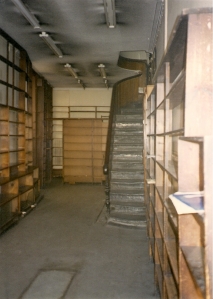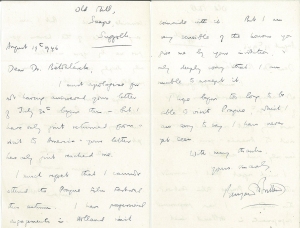Posts Tagged ‘‘Pred slunce vychodem’ [Before Sunrise].’
Dr. Bedřich Bělohlávek (1902 – 1991)
DR. BEDRICH BELOHLAVEK
My father was born in Czechoslovakia, in 1902.
His parents, Bedrich and Ruzena, were innkeepers from Pisek in southern Bohemia.
When my father was two years old, the family moved to Pribram, about fifty miles away from Prague. Pribram was then a prosperous mining town, its fortune built on silver.
His parents ran a small hotel, and also the café and restaurant attached to the town’s railway station.
In 1905, they produced a daughter, Ruzena, who died in 1907 and is buried in Pribram. My father never mentioned her existence, and I was greatly surprised to find out that he had not been an only child, after all.
From an early age, my father showed a rather precocious talent for music, and learnt to play the piano, entertaining the café and restaurant customers with popular tunes at mealtimes. He later studied the piano and composition at Prague Conservatoire, but instead of taking up music as a career became the music critic of Rude Pravo – the leading Czech Socialist newspaper, based in Prague.
It must be stressed that at no time in his life was my father a communist, or a member of the communist party. He had a social conscience, and like most of his generation regarded himself as a socialist, but he never subscribed to the political dogmas that emerged in the inter-war years. In fact, they frightened him and caused him great sorrow.
By 1924 he was supplanted at Rude Pravo by the Communist historian Zdenek Nejedly (1878-1962), and went instead to the Social Democratic newspaper Pravo Lidu as film critic.
In the same year, he set up Dobra Edice, a small publishing house, specialising in poetry, essays, and belles lettres. The books were produced with superb attention to detail, and were classic examples of European graphic design of the period. The example shown to the left Povoden Hlouposti was the result of my father being thrown out of Prague’s National Theatre. As a music critic, he had written a blistering attack on the entrenched attitude of the orchestra to rehearsals of a new work (Alban Berg’s ‘Wojcek’) and the musicians took offence. They refused to begin the evening’s performance while he remained in his critic’s seat, and several players pursued him out of the building, fists shaking. Alban Berg wrote a heartfelt letter of thanks for the stand my father had taken. The last publication appeared in 1934.
His opera libretto, Pred slunce východem (‘Before Sunrise’) was premiered as part of a double-bill at Prague’s National Theatre on 24th October, 1925. Composed by Emil F. Burian, it was directed by Ferdinand Pujman, with settings by Vlastislav Hofman. Conducted by Otokar Ostrcil, the opera was performed several times. It is set outside the Garden of Eden, with Eve about to give birth to the child of man.
In 1937, my father married. His bride was Frantiska Ungerova, a native of Prague, who had been brought up inVienna. Their wedding took place in Bulgaria, in Sofia Cathedral.
With the coming of the Nazis, my father fled to England. His journey was made possible by an influential acquaintance, who enabled him to make contact with the exiled Czech government based in London.

A concert given by the Inter-Allied String Quartet with Dr. Bedrich Belohlavek at the piano. (The ‘cellist is Terence Weil (1921-1995) then aged only 20. He later co-founded the renowned Melos Ensemble.)
While there, he planned what was to be the first festival of British Film to take place outside the UK. It opened in Prague in 1946, with a galaxy of leading actors and production personnel from both Britain and Czechoslovakia as guests.
The composer Benjamin Britten (1913-1976) was otherwise engaged, and sent an elegant letter of apology. The film ‘The Night Mail’ for which W.H. Auden had written the text, and Britten had composed the score, featured among the many documentaries shown.
My father returned briefly to Czechoslovakia in 1947 but the advent of the communist government in 1948 meant a second and permanent departure. He settled with his wife in London, and bought an ill-fated restaurant, Le Tabarin, 46 Gloucester Terrace, London W.2.
It served simple continental dishes, and was much-loved by its customers. Unfortunately, changing times, and my father’s over-generous nature meant that it didn’t stand a chance.
He became bankrupt, and c.1951 took a job with a London bookseller at No.16 Fleet Street, where he remained on the staff for thirty years. The shop stood next to Prince Henry’s Room, a timbered survivor of the Great Fire of London, 1666.

L. Simmonds – the shop signs
The firm of L. Simmonds was well-known to the legal profession, being in the centre of that world. It stood a few doors away from Middle Temple, and supplied vast quantities of law books, as well as serving local libraries, schools and colleges with more general stock.
My father’s boss, Louis Simmonds, was a remarkable man: diminutive in stature (like his wife, Rose) but big in heart, he commanded a loyalty from his staff that is now virtually unknown.

The narrow interior of the shop after its sale.
It seemed rare for anyone to leave, under any pretext, and this continuity contributed more than a little to the shop’s faintly Dickensian air. Dating from the early eighteenth century, the building had once been a coffee house. It was narrow and rather dusty, but an institution, and much loved by all who knew it. The creaking stairs led to the upstairs stockrooms where books were sorted for local and City libraries.
1951 saw the publication of Who’s Next ? The Lesson of Czechoslovakia. My father wrote the book under the pseudonym ‘John Brown’, and dedicated it to the memory of Jan Masaryk, whose murder he had always deplored.

Dr. Bedrich Belohlavek at his beloved Bechstein piano. The photograph was taken in Deal, c.1985. (Photographer: Basil Kidd for the East Kent Mercury)
(Note: The British Library in London now has an almost complete run of Dobra Edice publications, and various other works associated with my father. They can be found through the Slavonic Department, and in the general catalogue.)
Copyright  Francis Wright, 2012
Francis Wright, 2012
Share this:
Written by Francis Wright
August 16, 2014 at 7:10 pm
Posted in Uncategorised
Tagged with 'Pred slunce vychodem' [Before Sunrise]., 'Pred vychodem slunce' [Before Sunrise], 'The Night Mail' (W.H. Auden), Benjamin Britten, Bohemia, cello, Czechoslovakia, Dobra Edice, Dr. Bedrich Belohlavek, Emil F. Burian, Inter-Allied String Quartet, Maria Clementisova, Masaryk, Melos Ensemble, Pisek, Polish Hearth, Prague, Pribram, Smetana, Terence Weil, The Polish Musicians of London









